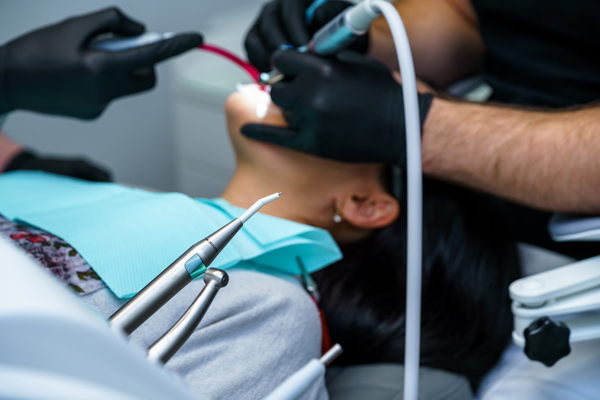3 Types of Gum Disease Treatment

General dentistry has several approaches to gum disease treatment. The goal is to prevent complications like tooth loss, relieve pain and discomfort, and restore the patient’s smile. Learning the basics of the most common types of gum disease treatment can help patients better understand why a specific approach is recommended for their oral health needs.
Understanding gum disease and its oral health impact
Gum problems tend to begin with gingivitis, an early stage of gum disease characterized by gum inflammation, redness, swelling, and occasional bleeding during brushing or flossing. Gingivitis can progress without treatment, eventually damaging the jawbone and tissues that support the teeth. Advanced gum disease can result in tooth mobility and even tooth loss.
Gum disease results from the buildup of plaque and tartar on the teeth, which harbor harmful bacteria that irritate and infect the gums. Risk factors include poor oral hygiene, smoking, hormonal changes, and certain medical conditions. Beyond oral health, untreated gum disease has been linked to systemic issues from heart disease to diabetes, another reason why it is important to treat it promptly.
Types of gum disease treatment
While gingivitis may be reversible with non-invasive procedures, advanced gum disease often requires more intensive interventions. Here are three common types of gum disease treatment commonly recommended in general dentistry:
Deep cleaning: Scaling and root planing
A deep cleaning called scaling and root planing can effectively treat mild to moderate gum disease. This non-invasive treatment involves removing plaque and tartar from above and below the gum line (scaling) and smoothing the root surfaces (root planing) to prevent bacteria from reattaching. Conversely, the gums can easily reattach to smooth, clean teeth roots.
A dentist or dental hygienist may use special instruments, ultrasonic devices, or laser technology to thoroughly clean the affected areas during scaling and root planing. As a result of this procedure, patients often experience reduced gum inflammation, tighter gum attachment, and an improvement in overall gum health.
Antibiotic therapy for gum infections
Antibiotic therapy often works alongside other treatments to target the bacterial infection causing gum disease. Dentists may recommend systemic antibiotics in pill form, as well as local antibiotic gels or dissolvable strips to be applied directly to the affected gum tissue. This gum disease treatment aims to reduce infection, relieve inflammation, and improve gum pocket depth, enhancing the overall efficacy of other treatments.
Surgical gum disease treatments
For advanced gum disease that has caused significant damage to the gum tissue or supporting structures, surgical intervention may be necessary. Surgical gum disease treatments include the following techniques, each of which can address specific issues:
- Flap surgery. Lifts the gums to access and clean deeper pockets of infection.
- Bone grafting. Restores bone density and supports the teeth.
- Soft tissue grafting. Covers exposed tooth roots and restores the gum line.
Surgical treatments are typically reserved for advanced gum disease but can be highly effective in restoring oral health and function.
Schedule a consultation for gum disease treatment
By promptly addressing gum disease with professional gum disease treatment, patients can maintain healthy gums, strong teeth, and overall well-being. Whether the patient has a mild or advanced case of gum disease, there are effective treatments available to restore their oral health. Call our Palmdale general dentistry office today to learn more.
Request an appointment here: https://www.kananidental.com or call Absolute Dental Care at (661) 234-7720 for an appointment in our Palmdale office.
Check out what others are saying about our dental services on Yelp: Gum Disease in Palmdale, CA.
Related Posts
Knowing when you need an emergency dentist can help save teeth, preserve oral health, and prevent serious complications. From sudden tooth pain to dental trauma, understanding the signs that require immediate attention helps ensure timely and effective care. Learning more about the role of an emergency dentist can prepare patients to act quickly in critical…
Having a full mouth reconstruction is a highly involved process. Whether you need one due to severe decay or infections, after suffering a dental trauma, or an issue you were born with, this procedure can help restore the full function and appearance of your smile. After a full mouth reconstruction, there are some helpful ways…
When it comes to replacing missing teeth, implant supported dentures are an effective and long-lasting choice. An implant is an artificial tooth root that is often inserted in the jawbone. It is used to hold an artificial tooth in place. All-on-4® dental implants are increasingly being recommended for people who need to replace multiple lost…
If you are nervous ahead of dental implant surgery, then it is helpful to learn useful ways to prepare mentally and physically for the procedure. This review offers advice on how to minimize anxiety and nervousness before dental implant surgery and help ensure that the procedure goes smoothly. The dentist should guide you through each step…
